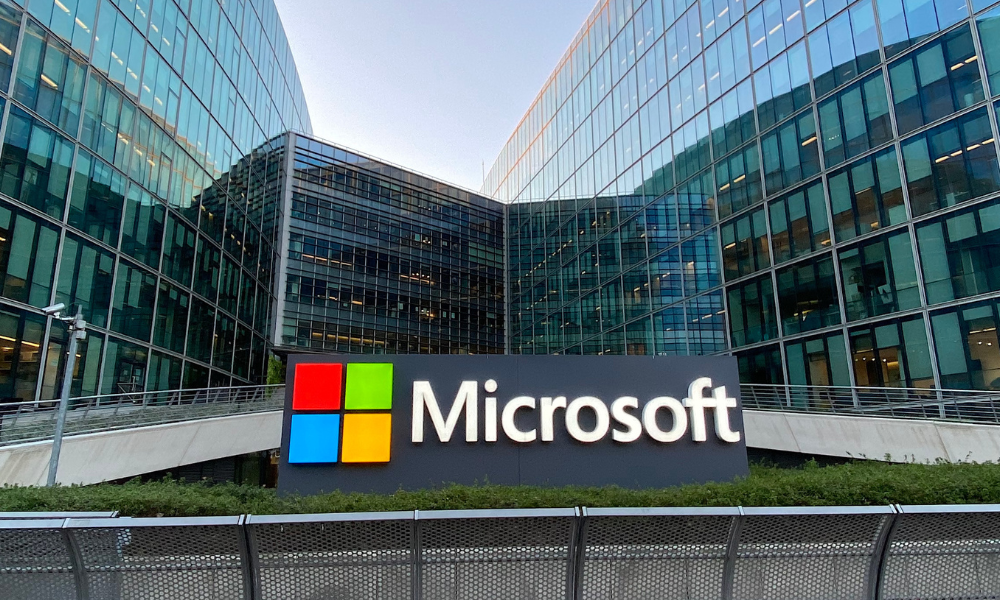

by Katie Greifeld
Microsoft Corp. is bigger than most countries’ whole stock markets and its bond rating would be the envy of many nations. Now a DoubleLine Capital portfolio manager is raising an uncomfortable — if theoretical — question about the software maker and its fortress balance sheet: Is it safer than the US government’s?
It’s just a thought experiment — the asset manager doesn’t own the technology giant’s bonds — intended to highlight the diverging state of public and private finances.
But the analysis shines a light on the ascendancy of the corporate sector and the unprecedented juggernaut status of the US technology behemoths at a time of intense hand-wringing in Washington about the nation’s deteriorating fiscal picture. It also points to why it may make sense for investors to buy corporate debt now even as valuations for the sector are near historic highs.
In one corner is Microsoft, which boasts pristine credit scores from Moody’s Ratings and S&P Global Ratings on long-term debt totaling about $45 billion. The technology titan is expected to generate nearly $48 billion of cash in its fiscal 2025, and it produced enough of a key kind of earnings in 2024 to pay its annual interest expenses more than 50 times over, according to a paper this month from DoubleLine.
That gives Microsoft “ample capacity to service its debt, even in challenging economic conditions,” portfolio manager Mariya Entina wrote.
Compare that to the US, whose credit standing has been in decline. While Microsoft produces ample free cash flow, the federal government has been running huge and growing deficits, and servicing its roughly $36 trillion in total debt is becoming more costly. The country’s receipts-to-interest expense has declined to 5.2 times as of 2023, from 6.7 in 2018, according to the paper. The government does have the luxury of collecting taxes and printing dollars, but its “high debt burden and rising interest costs” make for a challenging mix, according to Entina.
“These growing fiscal challenges raise serious concerns about the creditworthiness of Uncle Sam,” she wrote. “In contrast, top-rated corporate credits – like Microsoft – are backed by ample cash-generating assets and significant corporate treasury reserves.”
Treasury investors have been stung by losses in recent years, of course. But for many, this kind of narrow financial analysis misses the point. US government bonds are backed by the full faith of the most powerful economy in the world, with the asset class rallying in times of stress thanks to its superior liquidity and the dollar’s privileged position in international commerce and foreign-exchange reserves.
Indeed, even during debt-ceiling negotiations that brought the US to the brink of default, Treasuries rallied on haven demand, underscoring the time-honored investor preference for the asset class. Even as the Trump era creates a stress test for fiscal and monetary norms, US bonds remain the bedrock of the global financial system.
Nonetheless, ratings companies have taken note of the deterioration in the US fiscal position. Fitch Ratings downgraded the US’s sovereign credit one level to AA+ from AAA in 2023, echoing a 2011 move from S&P. Fitch’s reasoning at the time was that the nation’s finances were on course to weaken further over the next three years due to tax cuts, new spending initiatives, economic shocks and repeated political gridlock.
“High debt levels, political polarization and a not-so-pretty fiscal outlook weigh on the government’s once-golden reputation,” Entina wrote.
The Department of Government Efficiency, led by Donald Trump megadonor Elon Musk, is aiming to dramatically reduce government spending, though it’s unclear how it plans to reach its $2 trillion target. Treasury Secretary Scott Bessent has vowed to lower the budget deficit, which is currently running near 7% of gross domestic product.
That debate is playing out across bond markets. Microsoft boasts some of the lowest yields in corporate debt benchmarks, and its weighted cost of capital is close to zero, according to Bloomberg Intelligence.
Thirty-year Microsoft bonds yield about 0.5 percentage point over 30-year Treasuries, data compiled by Bloomberg show. Meanwhile, the spread on a Bloomberg index of long-term investment-grade debt is about 1 percentage point, down from a 10-year average of around 1.6 points.
“Higher-rated and safer are not necessarily the same,” said BI senior credit analyst Robert Schiffman. “But the degrees of separation are small enough that the incremental carry for owning one of the few remaining AAAs like Microsoft suggest mildly higher risk-adjusted excess return outperformance potential.”
Microsoft’s 0.06% five-year cumulative default risk “is a reasonably good proxy for the US government’s risk free alternative.”
Copyright Bloomberg News

Canadian stocks are on a roll in 2025 as the country prepares to name a new Prime Minister.

Two C-level leaders reveal the new time-saving tools they've implemented and what advisors are doing with their newly freed-up hours.

The RIA led by Merrill Lynch veteran John Thiel is helping its advisors take part in the growing trend toward fee-based annuities.

Driven by robust transaction activity amid market turbulence and increased focus on billion-dollar plus targets, Echelon Partners expects another all-time high in 2025.

The looming threat of federal funding cuts to state and local governments has lawmakers weighing a levy that was phased out in 1981.
RIAs face rising regulatory pressure in 2025. Forward-looking firms are responding with embedded technology, not more paperwork.
As inheritances are set to reshape client portfolios and next-gen heirs demand digital-first experiences, firms are retooling their wealth tech stacks and succession models in real time.
